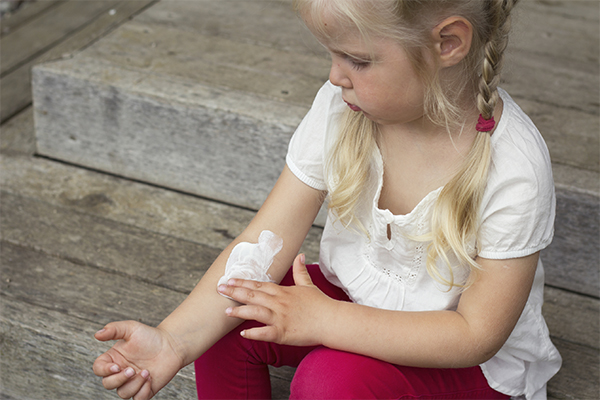Your child has a red itchy rash that will not go away? It could be a symptom of a number of things, but how do you know if your child has eczema?
Most often eczema shows itself on children between the ages of 6 weeks to 1 year old. The cause of the skin disorder is unknown, although it is inherited and triggered by external factors and circumstances. It is not unusual for a child who suffers from eczema to have a close relative who suffers from asthma or hay fever, and a child with eczema has a greater chance of developing both conditions.
Eczema can affect any part of a child’s body but is especially known to affect the inside of the elbow area, behind the knees and on a child’s cheeks.
According to the National Eczema Association, “Eczema affects between 8.7 to 18.1percent of all infants and children” and at least 70 percent of people with eczema have hand eczema at some time in their life. In most cases, the symptoms of the skin disorder either lessen dramatically or desist by adulthood.
Eczema can be difficult to diagnose because its appearance can vary from child to child. The rash associated with eczema is different from other rashes in that it tends to stay around longer and often comes back soon after it disappears. The itch associated with the skin disorder is intense, and chronic scratching can lead to staph and strep infections.
What can you do to manage your child’s eczema?
- Get a proper diagnosis from a physician.
- Keep your child’s skin dry and clean as much as possible.
- Bathe your child daily.
- Add ¼ cup of bleach per half bathtub of water to your child’s bath a few times a week.
- Use a product with a petroleum jelly base to protect skin and folds from drooling.
- Keep your child’s skin moisturized with an unscented ointment or cream.
- Avoid triggers such as dust mites, pet hair, cigarette smoke and products containing dyes and fragrances.
- A physician should see your child if symptoms are not responding to bathing and moisturizing efforts. In most cases, a topical steroid will be prescribed. An oral or injectable anti-inflammatory medication may be prescribed in severe cases.
- Keep your child’s fingernails trimmed short.
- Have your child wear mittens to bed to keep from scratching while they are asleep.
There are a number of over-the-counter products created just for the management of eczema, including calming body washes, cleansers and shampoos. These products along with a regular bathing and moisturizing routine often allow for the management of eczema at home.
Children’s Hospital of Georgia is the only hospital in the area completely dedicated to the care and well-being of children. At CHOG, we care enough to ensure that your child gets the attention he or she deserves in order to receive a proper diagnosis. CHOG cares about children.
For more information about CHOG, please visit our website at augustahealth.org/chog or call 706-721-KIDS (5437).
Source: National Eczema Association.




